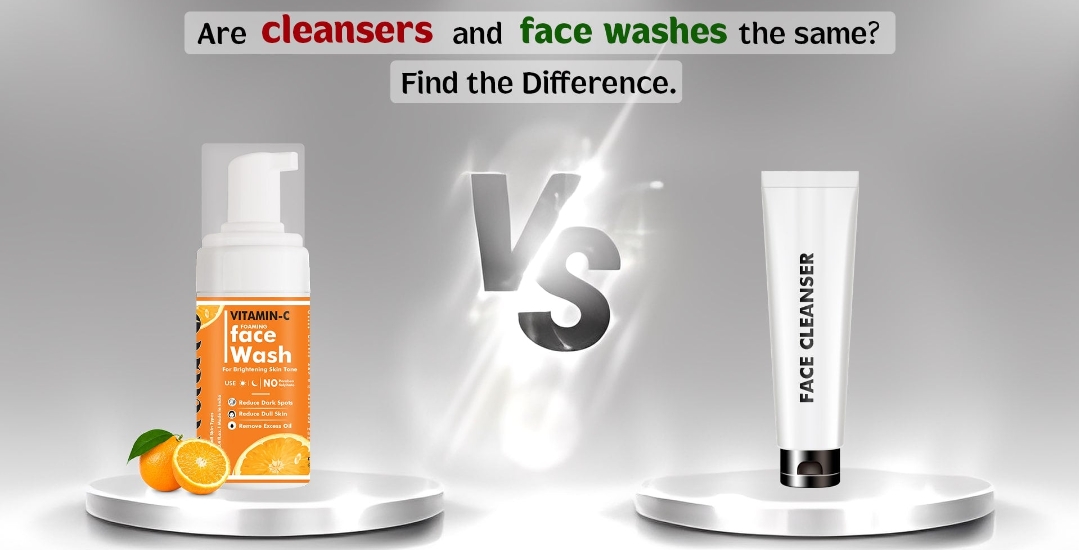
Introduction
Choosing the right product for your daily skincare routine can sometimes be confusing. A common question that arises is, “Can I use cleanser instead of face wash?” While these terms are often used interchangeably, there are subtle differences between a cleanser and a face wash that might affect your skin. In this article, we’ll explore what distinguishes a cleanser from a face wash, discuss the benefits and potential drawbacks of each, and help you decide which option best suits your skin type and lifestyle.
Understanding the Basics
What Is a Cleanser?
A cleanser is a broad term that refers to any product designed to remove impurities, makeup, and excess oil from the skin. Cleansers come in various forms—such as creams, gels, oils, and balms—and are formulated to cater to different skin types, from dry and sensitive to oily and acne-prone.
What Is a Face Wash?
A face wash is a type of cleanser that is typically water-based and has a foaming or gel-like consistency. It is generally used in the morning or evening as part of your skincare routine to deeply clean the skin, removing dirt, sweat, and impurities. Face washes are usually formulated with active ingredients to target specific skin concerns like acne or excess sebum.
Key Differences Between Cleansers and Face Washes
Texture and Consistency
- Cleansers: Often come in non-foaming, cream, oil, or balm forms. They tend to be richer and more hydrating, making them ideal for dry or sensitive skin.
- Face Washes: Typically have a light, foamy texture. They work well for oily or combination skin, where the goal is to remove excess oil without over-drying.
Application and Use
- Cleansers: Can be used with or without water, depending on the formulation. Oil-based cleansers, for example, are effective at breaking down makeup and can be followed by water-based rinsing.
- Face Washes: Are generally applied to wet skin, lathered, and then rinsed off. They are designed for a quick, deep clean and are often part of a morning routine.
Skin Benefits
- Cleansers: Offer gentle cleansing and hydration, often containing ingredients like oils, glycerin, and antioxidants that nourish the skin.
- Face Washes: Are formulated to provide a thorough cleanse, which can be beneficial for acne-prone or oily skin, but might be too harsh for dry or sensitive skin if overused.
Can You Use a Cleanser Instead of a Face Wash?
Yes, It’s Possible—Depending on Your Skin Type
- For Dry or Sensitive Skin: Using a cream or oil-based cleanser may actually be more beneficial than a foaming face wash. These cleansers clean without stripping away natural oils, helping maintain the skin’s moisture barrier.
- For Oily or Acne-Prone Skin: A face wash might be more effective in controlling oil and preventing breakouts. However, if your skin is moderately oily and you find that face washes are too drying, a gentle cleanser can be a good alternative when followed by a light moisturizer.
Consider Your Skincare Goals
- Deep Cleaning vs. Hydration: If your primary goal is deep cleaning, especially after a long day or an intense workout, a face wash might offer that extra level of cleansing. On the other hand, if you want to focus on hydration and maintaining a healthy skin barrier, a gentle cleanser could be the better choice.
- Layering Skincare: Some skincare routines involve double cleansing—using an oil-based cleanser first to remove makeup and sunscreen, followed by a water-based face wash to clean the skin. If you prefer a simpler routine, you might opt for a cleanser that can do both.
Practical Tips for Choosing the Right Product
- Know Your Skin Type: Understanding whether your skin is oily, dry, combination, or sensitive is crucial in deciding whether to use a cleanser or a face wash.
- Read Ingredient Lists: Look for products free of harsh chemicals and fragrances if you have sensitive skin. Ingredients like hyaluronic acid, glycerin, and natural oils can provide extra hydration.
- Test Before Committing: If you’re switching products, try a sample or a travel-size version first to see how your skin reacts.
- Adjust Based on Season: Your skin’s needs can change with the seasons. You might prefer a hydrating cleanser during the winter and a lighter face wash during the summer.
- Consult a Dermatologist: When in doubt, a professional can provide personalized advice based on your skin’s condition and needs.
Conclusion
So, can you use cleanser instead of face wash? The answer is yes—if you choose a product that aligns with your skin type and skincare goals. While face washes are ideal for deep cleansing, especially for oily or acne-prone skin, gentle cleansers can offer a more hydrating and less irritating alternative for those with dry or sensitive skin. Ultimately, the best approach is one that maintains a healthy balance, ensuring your skin is clean, hydrated, and protected.
By understanding the differences between these two products and how they impact your skin, you can make informed decisions that contribute to a glowing and healthy complexion. Remember, the key is to listen to your skin and adjust your routine as needed.
Disclaimer: This article is for informational purposes only and does not substitute professional skincare advice. For personalized recommendations, please consult a dermatologist or skincare specialist.
Also Check:
• Can Sunken Eyes Be Reversed? A Comprehensive Guide
• Can Cylindrical Power Be Corrected Naturally? Exploring Natural Approaches to Astigmatism
• Can Dental Fillings Fix Teeth Spacing, or Do You Need Braces?
• Can Pregnant Women Eat Maggi? Exploring Safety, Nutrition, and Best Practices



